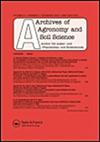An antagonist of Caenorhabditis elegans controls root-knot disease and promotes tomato plant growth
IF 1.8
4区 农林科学
Q1 AGRONOMY
引用次数: 0
Abstract
ABSTRACT Continuous cropping often leads to plant diseases caused by root-knot nematodes (RKN). Owing to the difficulty in laboratory culture of RKN, microbial biocontrol agents are mainly screened for through contact killing assay, which requires a substantial effort to acquire RKN. This study was undertaken to verify the feasibility of using Caenorhabditis elegans – a model nematode that can be easily grown in the laboratory – to screen for microbial antagonists against RKN. Tomato (Solanum lycopersicum L. cv. Houpi Maofen 802) plants were grown in pots containing RKN-infested soil with and without inoculation of an antagonistic actinobacterial strain, designated Streptomyces albidoflavus T4. Exposure to T4 culture filtrate that contained catecholate siderophore and indole acetic acid resulted in a mortality rate of 95.4% for C. elegans and increased seed vigor by 113% for tomato. While root rotting rate and RKN incidence decreased following T4 inoculation, plant survival rate and stem diameter increased correspondingly. The root-associated microbiota of inoculated plants were optimized, as indicated by increased proportions of potentially beneficial bacteria (e.g. Bacillus amyloliquefaciens) and decreased proportions of pathogenic fungi (e.g. Fusarium oxysporum). The results demonstrate the outstanding performance of S. albidoflavus T4 to control root-knot disease and benefit tomato plant growth through multifaceted mechanisms.秀丽隐杆线虫拮抗剂控制根结病并促进番茄植株生长
连作经常导致由根结线虫引起的植物病害。由于RKN的实验室培养困难,主要通过接触杀死法筛选微生物生防剂,这需要大量的努力才能获得RKN。本研究旨在验证使用秀丽隐杆线虫(一种可以在实验室中轻松生长的模式线虫)筛选RKN微生物拮抗剂的可行性。番茄(Solanum lycopersicum L.cv.Houpi Maofen 802)植物在含有RKN感染土壤的盆中生长,接种和不接种拮抗放线菌菌株,命名为白色链霉菌T4。暴露于含有儿茶酚酸酯铁载体和吲哚乙酸的T4培养滤液中,秀丽隐杆线虫的死亡率为95.4%,番茄的种子活力增加了113%。接种T4后,根系腐烂率和RKN发生率降低,植株存活率和茎粗相应增加。接种植物的根相关微生物群得到了优化,潜在有益细菌(如解淀粉芽孢杆菌)的比例增加,病原真菌(如尖孢镰刀菌)的比例降低。研究结果表明,白曲霉T4在控制根结病和促进番茄生长方面具有突出的作用。
本文章由计算机程序翻译,如有差异,请以英文原文为准。
求助全文
约1分钟内获得全文
求助全文
来源期刊

Archives of Agronomy and Soil Science
AGRONOMY-SOIL SCIENCE
CiteScore
5.50
自引率
4.20%
发文量
107
期刊介绍:
rchives of Agronomy and Soil Science is a well-established journal that has been in publication for over fifty years. The Journal publishes papers over the entire range of agronomy and soil science. Manuscripts involved in developing and testing hypotheses to understand casual relationships in the following areas:
plant nutrition
fertilizers
manure
soil tillage
soil biotechnology and ecophysiology
amelioration
irrigation and drainage
plant production on arable and grass land
agroclimatology
landscape formation and environmental management in rural regions
management of natural and created wetland ecosystems
bio-geochemical processes
soil-plant-microbe interactions and rhizosphere processes
soil morphology, classification, monitoring, heterogeneity and scales
reuse of waste waters and biosolids of agri-industrial origin in soil are especially encouraged.
As well as original contributions, the Journal also publishes current reviews.
 求助内容:
求助内容: 应助结果提醒方式:
应助结果提醒方式:


